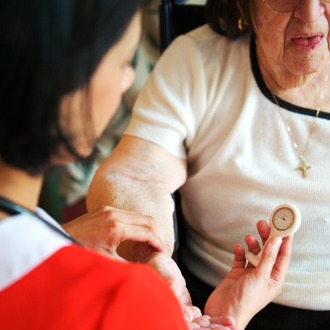Care home providers have announced they are to stop paying GP practices retainer fees to provide extra care to nursing home residents, in a long-running battle over locally agreed enhanced services.
Care England, described as the largest representative for the Care Home industry, said care homes have ‘called a halt to the unethical practice of GP retainers’, after providers claimed they were mostly paying extra for ‘basic’ services that should be provided under the GMS contract.
It also called on the CQC to monitor the provision of care given by GP practices to care homes, and for a change to the GP contract to ‘specifically state which services GPs have a right to charge for and which should be free’.
But GP leaders pointed out that practices paid to be retained by a care home under enhanced services were ‘going the extra mile’ and that providers were often overestimating what practices should be expected to deliver.
A previous Care England report from 2008 called for an end to retainer fees for GP practices. Now, in updated research, it said 30 of 34 care homes that responded to a survey were paying a retainer to a GP practice – but only two of these described the service they were paying for as ‘enhanced’.
It said one provider was paying between £1,000 and £2,400 per month for a basic service.
As a result, it said care homes had decided to no longer pay retainer fees.
The chief executive of Care England, Professor Martin Green, said: ‘Our members will no longer pay retainers to GP practices; this should be no surprise to GPs as we have been making arguments regarding their unfairness for many years.’
It also called for NHS England to review what constitutes an enhanced service, and for the CQC to ‘monitor the practices of GPs in this regard’.
Related stories
Field criticises GPs for charging ‘retainers’ for care home provision
GPs told to say ‘no’ to care home antiviral requests until LES is agreed
Professor Green said: ‘We need clarification as to what differentiates basic and enhanced services from a GP. We accept that enhanced services can be paid for and that these arrangements can be independently negotiated between a home and a practice, but as it stands the definition of a basic service offered in the GMS contract is far too vague to enable negotiations to take place in many areas.’
Dr Richard Vautrey, deputy chair of the GPC, said: ‘Practices when they are paid a retainer will go the extra mile – for example doing extra ward rounds, doing regular reviews when patients aren’t necessarily unwell, they are much more proactive – and this in many ways reduces the costs for care home owners.’
He added that practices themselves wanted ‘greater clarify about the situation relating to care homes’ because ‘many patients are being inappropriately placed in care homes, leaving practices with huge responsibilities for caring for people in the community without the resources to provide it’.
He said: ‘We would welcome NHS England to invest properly in extra services for patients in these environments.’
Last year, the chief inspector of primary care, Professor Steve Field, said he was ‘disturbed by… newspaper reports about GPs refusing to talk on patients from care home unless they get a fee’.

















